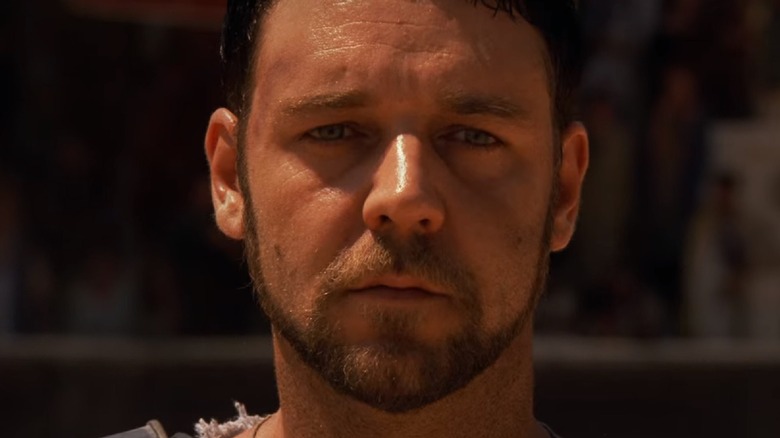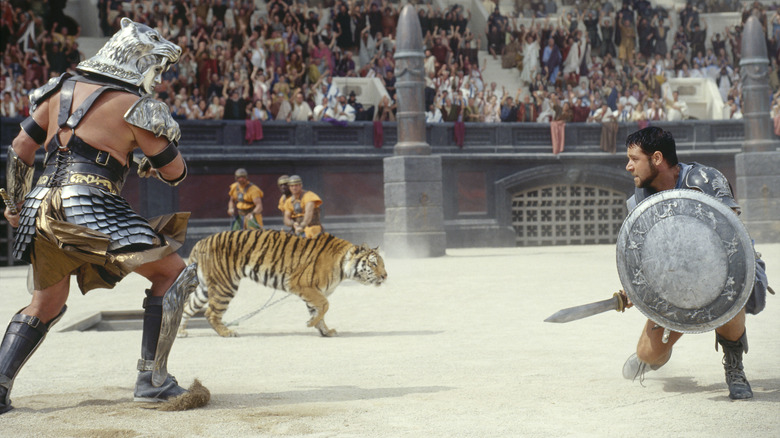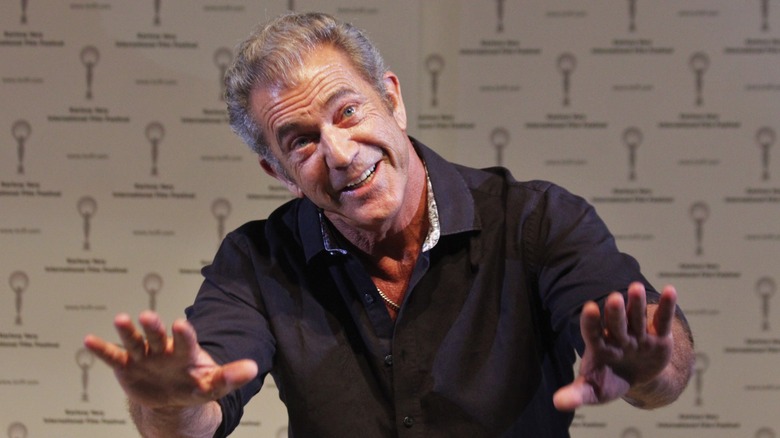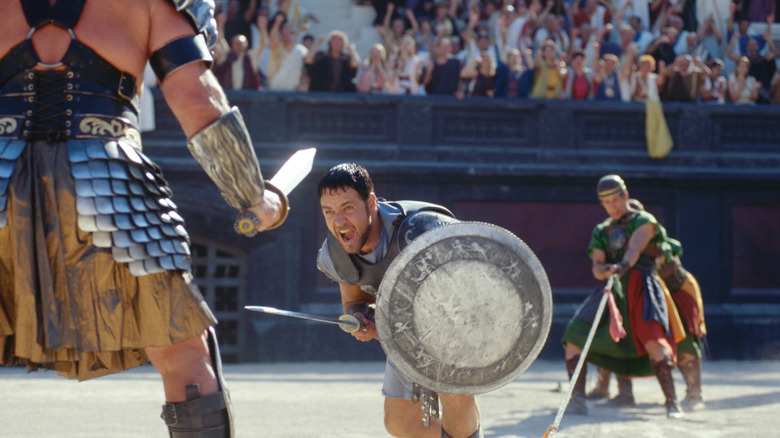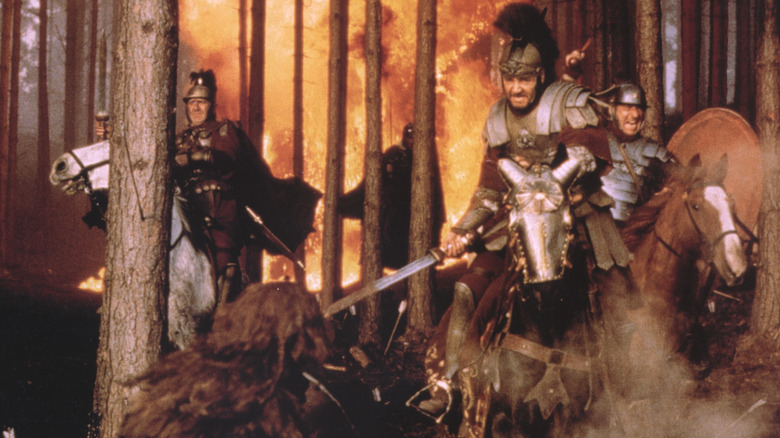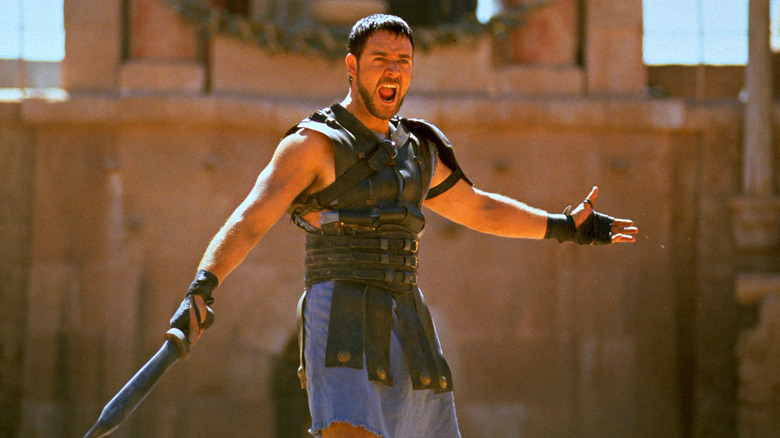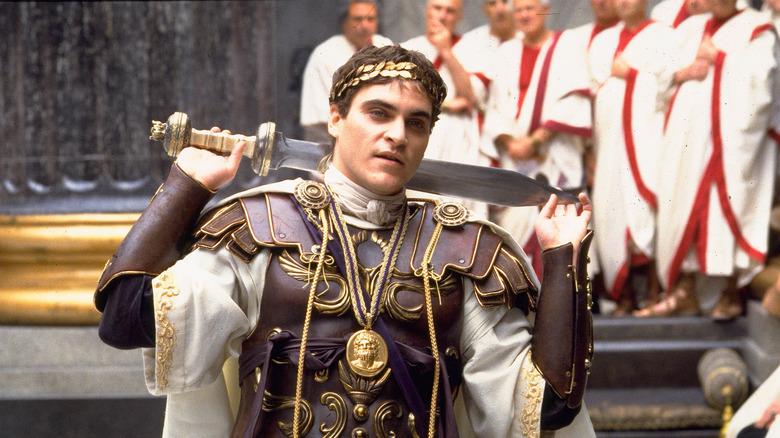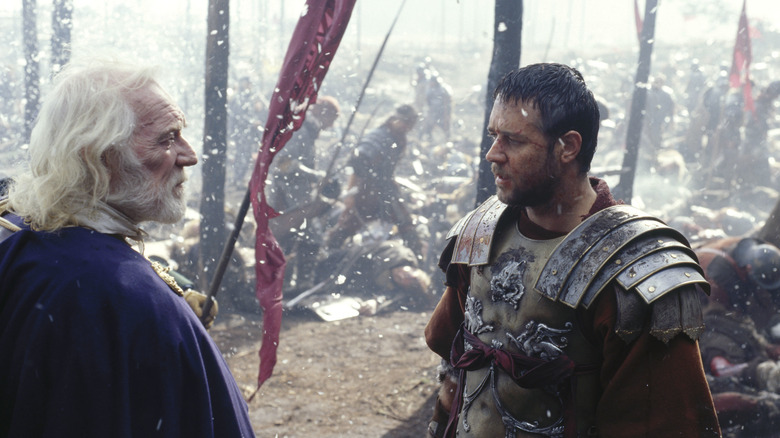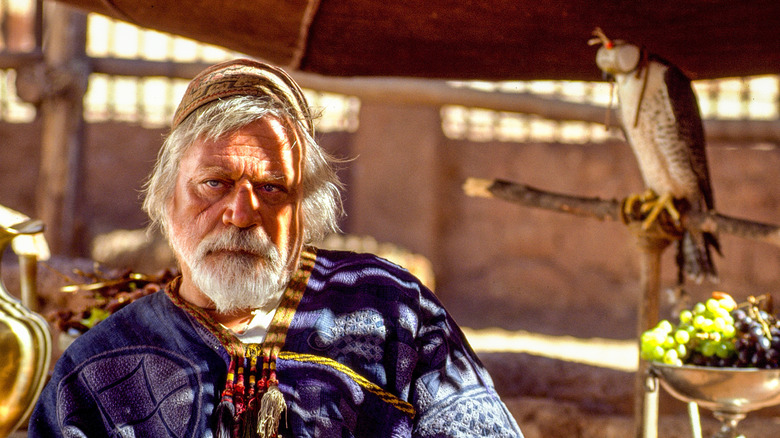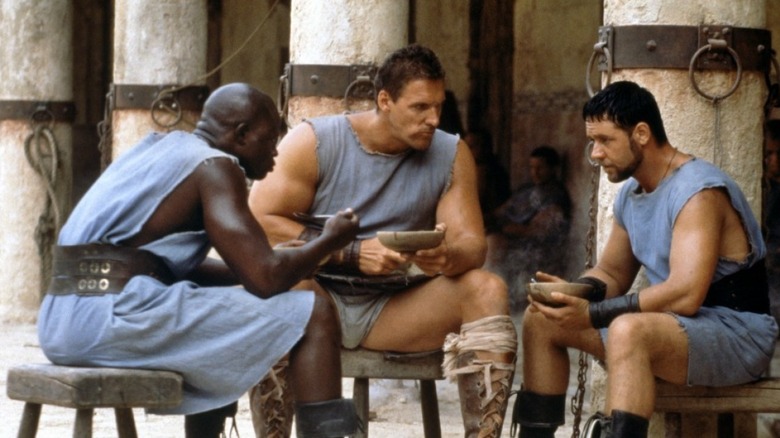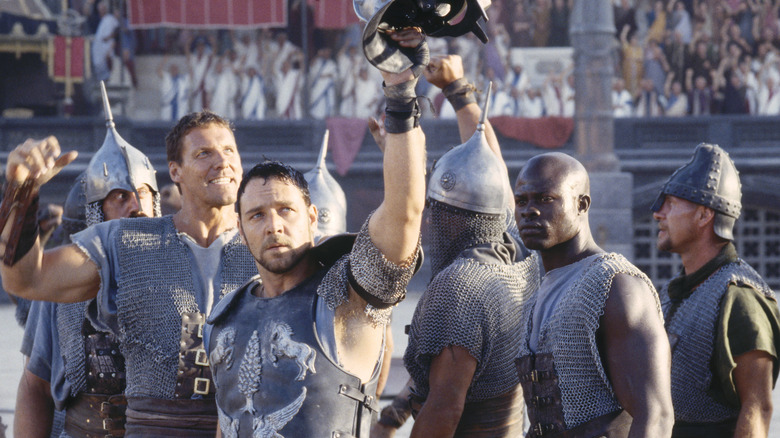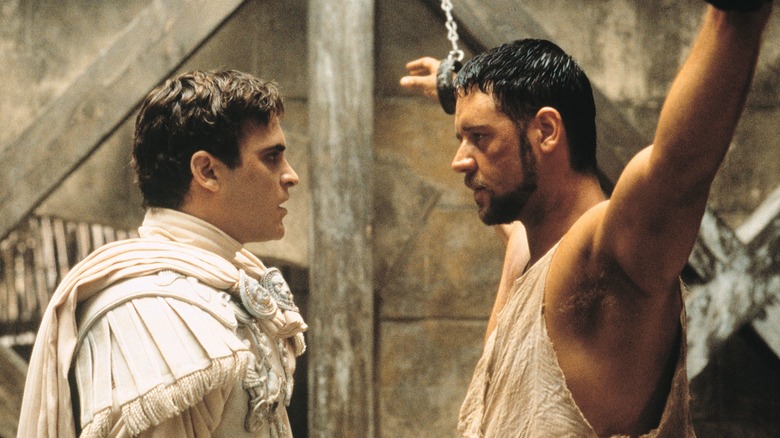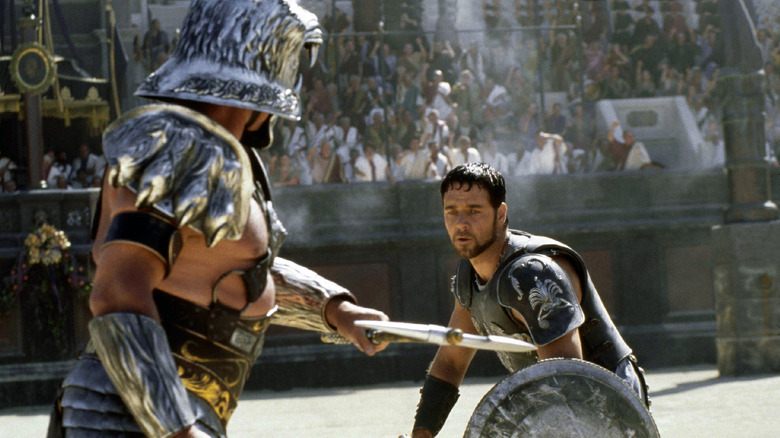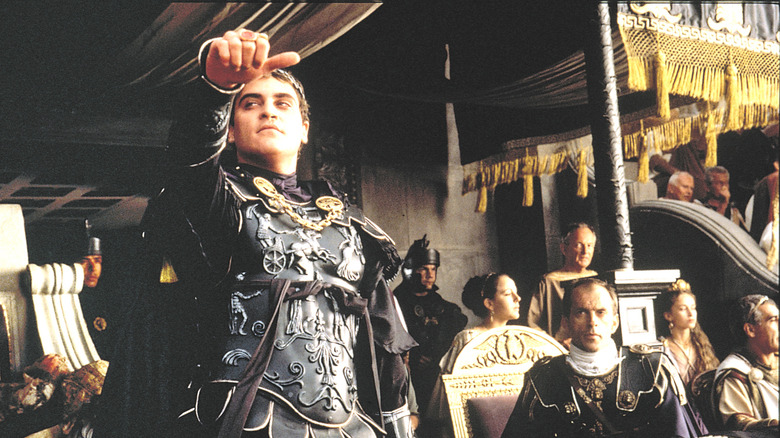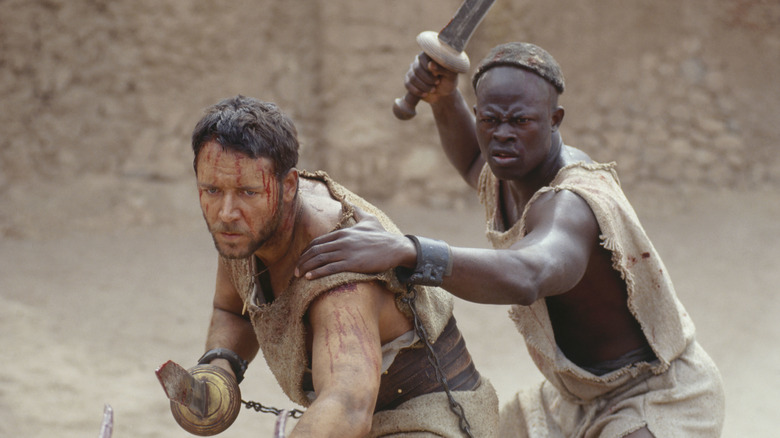Thumbs Up For These Thrilling Gladiator Facts
At the turn of the 21st century, movies about buff and moody guys in leather sandals, brandishing big swords, and strutting around the palace in a bid to secure their name in eternity weren't deemed all that popular. We were at the dawn of the internet age and collectively looking forward to a new millennium that glittered with the promise of enlightenment, utilitarianism, and technological revolution. Movies set in a more primitive and barbaric era, where callous and sneering villains butchered entire families and the righteous were put in chains and forced to fight to the death, were considered the prerogative of another era. However, Ridley Scott's "Gladiator" reminded everyone, everywhere, that you can't beat a timeless yarn — especially when it involved a heady dose of heartbreak, some epic revenge, a villain with no redeeming qualities, and a hero who never compromises, never retreats into self-pity, and never gives in.
"Gladiator" took what made sword-and-sandal classics such as "Ben Hur" and "Spartacus" special, infused the formula with a little rocket fuel, and upgraded and supercharged it for a new century. Epic in scope and engagingly entertaining, this Hollywood classic grabbed the audience by the scruff of the neck, lifted them off the floor, shook them senseless, and demanded in the words of Maximus, "Are you not entertained?" We were, are, and forever will be by a box office smash that won five Oscars and launched a raft of imitators. What better time than to return to the arena and look beyond the roar of the crowd, the impenetrable expression of "those about to die" and find out exactly what went on behind the scenes of "Gladiator."
A Jean-Leon Gerome painting inspired Ridley Scott to direct Gladiator
As a hard and fast rule, the seeds of any movie are planted in the script. It all begins with the written word. It's the job of the director and actors to bring that vision to life with technique, technology, artistry, mastery, and a lot of teamwork. Any idea for a film, no matter how great, usually has to be conveyed in words before the on-the-ground work can begin and new worlds and frontiers can be made a reality. The genesis of "Gladiator" was a little different. Ridley Scott explained to Variety that he's "a very visually driven director" and was so inspired by a 19th-century painting that producer Walter Parkes showed him, he immediately signed up to direct "Gladiator" without seeing a script.
According to Scott, a Jean-Leon Gerome painting featuring a gladiator standing tall over his vanquished opponent whilst making eye contact with the emperor was enough to convince him that "Gladiator" was a movie worth making. Scott explained that seeing the gladiator clad in armor, "looking up at a black marble wall at this purple-faced Nero out of his mind on wine or water" while giving the thumbs down verdict "was like a flash." He added, "When you're experienced like me, you can do a little knee-jerk flash decision, and normally it's accurate. So I said, 'I'll do it.' Parkes said, 'Hang on, you don't know what the story's about.' I said, 'I don't care, I'll do it,' and that was it."
Mel Gibson was originally offered the role of Maximus
Five years before Russell Crowe mesmerized audiences with the brooding intensity, righteous wrath, principled demeanor, and flair for violence that best embodies Maximus, Mel Gibson was doing a similar thing in the guise of William Wallace in "Braveheart." Both "Gladiator" and the movie about the wronged Scot who took on the might of the English army proved there was still a massive market for movies with swords, stirring speeches, blackhearted villains, and lone heroes facing overwhelming odds. A year after "Gladiator," the Lord of the Rings franchise would unmistakably hammer this point home.
According to The New York Times, Gibson was originally offered the role which made Crowe famous. The nuanced mixture of a sensitive soul and vengeful psychopath that Gibson brought to bear on the role of Wallace would have probably worked equally as well for Maximus. Both characters have all they hold dear wiped out by the callous whims of egotistical tyrants who represent a cruel and corrupt regime. Wallace and Maximus also both have a strict sense of right and wrong even when they are busy decapitating and disemboweling their fellow men. We Got This Covered reports that Gibson passed on the role of Maximus to play Benjamin Martin in "The Patriot," a movie whose mix of sentimentality and sadism failed to strike the delicate balance needed to give it wings. "Gladiator," on the other hand, soared like a phoenix.
A replica of the Colosseum was built for the film
As the ancient world's biggest amphitheater and an arena where matters of life and death were decided daily, Rome's Colosseum has left a huge imprint on history. It has also left something of a significant bloodstain. The Colosseum is the perfect symbol of humanity's dual urge to create and destroy writ large in stone. With seating that catered to an audience of 50,000 strong, the Colosseum was bringing rock n' roll to the masses centuries before Elvis Presley checked in "The Heartbreak Hotel" or The Beatles wanted to hold your hand. Of course, the savagery of spectacle that the Colosseum accommodated was a little different from Ozzy Osborne biting the head of a bat on stage. Today, recreating the imposing and majestic architecture of such a structure would be a simple case of calling the CGI specialists in, but back in 2000, they preferred to opt for a combination of both technology and leg work.
The Guardian reports that Scott was thrilled to be afforded the chance to bring ancient Rome to life and wanted to keep the vibe on set as real as possible. Heading to a vacant parade ground in Malta, Scott set about recreating the sprawl, sense, and space of Rome on land miles removed from the Eternal City. Anyone who's seen "Gladiator" will testify to the glory of the set, but it's the Colosseum that steals the show. Standing at 16 meters tall, its first tier was built by hand, and the remaining two tiers were a smoke and mirrors product of the CGI department. The same method was applied to its circumference and the baying crowds. Yet the effect is flawless, seamless, and as close to Imperial Rome as we're ever likely to get.
A real forest was burned down for the opening battle scene
In this more environmentally aware age, burning down a forest just to give a battle scene between Roman legionaries and the hordes of barbarians an added authenticity would seem a step too far in the direction signposted "criminally irresponsible." Yet with a sizable budget and a film to shoot that needed to grip the viewer's attention from the get-go, Ridley Scott needed to go big. Fortunately for the director, a large area of the forest in Surrey, England, where the opening scene in "Gladiator" is filmed, was scheduled for deforestation prior to filming. The Sun reports that when Scott got wind of the forthcoming cull, he contracted the Forestry Commission and offered to kill two birds with one stone.
The authorities got someone to maintain Bourne Wood free of charge and Scott got the heat and fury of a bona fide battle in the heart of "Germania." Since "Gladiator" put Bourne Wood on the map, it has been used in countless other films: "Robin Hood," "Avengers: Age of Ultron," "Sherlock Holmes: A Game of Shadows," "Captain America: The First Avenger," "Wonder Woman," and "Harry Potter and the Deathly Hallows" have all filmed scenes in the ancient woodland. Its proximity to London makes it a firm favorite with filmmakers, and the money generated through shoots is plowed back into its upkeep.
Gladiator was inspired by a book
At its heart, "Gladiator" is a simple revenge story. The cruel and overprivileged lord of the manor ruins a good and noble man's life out of pure spite and toxic envy, and the hero vows to right this wrong by wading knee-deep in a torrent of carnage and blood. "Gladiator" is the sort of epic and emotive movie that doesn't need an intricate plot to make it work. However, it was heavily influenced by a book that screenwriter David Franzoni stumbled across by chance in Baghdad when he was a young college graduate in the 1970s. Film School Rejects reports that Daniel P. Mannix's "Those About to Die (aka The Way of the Gladiator)" left a big mark on Mannix, who was enthralled by tales of those who fought and died in the Roman games.
The factual book is a no-holds-barred account of the true depravity and slaughter that took place in Roman arenas in the name of entertainment. Its pages transported Franzoni back to another time and place when the height of civilized culture walked hand in hand with the collective cruelty and sadistic appetite of the insatiable hordes. It was heady and intoxicating stuff and Franzoni decided it could provide the raw materials of a great movie. In the final product, historical facts were approached with a certain liberty, the Roman Empire was given a modern makeover to make the gladiatorial games look more relevant to our age of huge sporting events, but the essence of the gory and disturbing details Franzoni found in Mannix's book remained. "Gladiator" gave the vicarious generation of a new millennium a raw and bloody taste of how the ancients used to get their rocks off.
Joaquin Phoenix insisted on wearing synthetic leather
Although they enjoyed a fierce reputation as a nation-state built on blood and conquest, being a vegetarian or a vegan in ancient Rome was not as unusual as you might think. According to Encyclopedia Britannica, many ancient Greco-Romans were keen proponents of the plant and mineral diet. In Rome, only the rich could afford to tear into animal flesh regularly, but because polyester, spandex, or Nike's vegan range wasn't a thing back then, your average Roman would have had to wear wool or leather, which posed a tricky dilemma for long-term vegan Joaquin Phoenix when it came to playing the bloodthirsty Emperor Commodus in "Gladiator."
As a merciless dictator and vengeful tyrant, Commodus has no qualms about butchering everything and anything if it offends his sensibilities. Obviously wearing the skin of dead animals is not going to be a bone of contention for such a man. Yet according to ABC News, so fierce are Phoenix's vegan principles he refused to wear leather when playing the Roman overlord and the costume department had to kit him out with a synthetic substitute. PETA reports that Phoenix, who has made the same stance on his wardrobe when playing characters in other films such as the Johnny Cash biopic, "Walk The Line," explained, "My lifestyle is part of who I am and therefore is always a consideration when working. I always discuss this with producers, and they are very accommodating."
Ridley Scott had his hands full keeping Russell Crowe, Oliver Reed, and Richard Harris in check
As well as being prodigal talents, the late Oliver Reed and Richard Harris also had a reputation for being committed and uncompromising. With his star on the rise at the time, Russell Crowe also had a similar, no-nonsense, head-down, and charge-on approach to the art of acting and life. Putting all three prickly thespians on the set of an alpha male-type movie such as "Gladiator" was always going to be a combustible situation. Ridley Scott, who was also no stranger to speaking his mind, certainly had his hands full. Recalling his time on the set, Garth Pearce wrote in The Sun that Crowe did a lot of moaning about the script, the weather, and the boredom until Scott finally exploded and snarled, "He thinks he can pull that s**t with me? I'll go back to Hollywood and bury him." Scott would later add, "He had to learn there was only one person in charge — and that was the director." Allegedly, executive producer Branko Lang also described Crowe as "a bit of an a**hole."
Not to be undone by the behavior of the brash newcomer, elder statesman Harris, who plays Emperor Marcus announced on day two of filming, "I've read that I am in a movie, starring Oliver Reed. Can I make one thing clear? I would never be caught dead in a movie starring Oliver Reed. Are we understood?" As for Reed, when not busy playing gladiator trainer Proximo, he was busy drinking his own body weight, arm-wrestling with sailors, and getting banned from hotel bars. Sadly for Reed, the film would mark his last.
If you or anyone you know is struggling with addiction issues, help is available. Visit the Substance Abuse and Mental Health Services Administration website or contact SAMHSA's National Helpline at 1-800-662-HELP (4357).
Oliver Reed died during filming and was replaced by a computer-generated double
On the eve before Oliver Reed died of a fatal heart, The Sun reports the hard-living 61 had downed a phenomenal amount of alcohol. The next morning was another non-filming day, and he returned to his favorite local pub early on in the day. Later, his pallor was worrisome, and his wife called an ambulance. However, it was too late, as Reed died before he could finish filming his last scene for "Gladiator." Crew member Rob Harris explained that when filming recommenced, "We all waited for words from Ridley Scott — which never came. It was a case of into the valley of death — forward march."
Although Reed has a relatively small role in "Gladiator" as the slave dealer who owns Maximus, it is an integral one. In the wake of Reed's death, Scott was faced with the problem of how to seamlessly finish the film and honor Reed's memory. The answer came, as it so often does, in the shape of technology. Scott explained to Variety, "We managed to finish off what was required from Oliver, stealing digital images of this face and attaching them to an appropriate body." Although an easy ask by today's standards, at the turn of the century, such cinematic trickery was completely novel — and expensive, too, to the tune of $3.2 million spent for just two minutes of screen time featuring the image of Reed from beyond the grave.
If you or anyone you know is struggling with addiction issues, help is available. Visit the Substance Abuse and Mental Health Services Administration website or contact SAMHSA's National Helpline at 1-800-662-HELP (4357).
Changes were made to the script while filming
Movie scripts usually go through numerous rewrites before they are fit for purpose and directors often like to emphasize their organic quality. Yet, there's organic, and there's driving blind and making it up as you go along. Which in a sense was the case with "Gladiator." Fortunately, the approach worked well. Russell Crowe explained to Variety he'd cast his eye over the original script and thought, "It wasn't a movie." Yet the opportunity to work with Ridley Scott was too good an opportunity to miss. Scriptwriter David Franzoni revealed he and Scott were determined to steer well clear of the classic sword and sandal movies and used foreign cinema as their blueprint. He was also open to cast members suggesting various ideas for major rewrites during pre-production and throughout the entire shoot.
Scott, Franzoni, and Crowe often met during filming to discuss how the script could be given an extra charge of energy and new dialogue was often written on the hoof. Franzoni explained, "We'd all drink whiskey and smoke cigars. We'd exchange notes and ideas. Then I'd go back and write at three or four in the morning and I'd hand the pages to Ridley. During the shoot, I went off and met with Russell. We would meet almost daily before he would go shoot and talk about the scenes. I remember once we were sitting on the ground, drawing things in the sand. It was a very 60s way to make a film." Crowe added, "I've often said to Ridley since, 'One of these days we should actually do a film where we know what we're going to do before we start.'"
The movie was responsible for the Gladiator Effect
Films that are as epic in scope and as unique as "Gladiator" tend to have a ripple effect. People will fall over themselves to cash in on the momentum of anything that is riding the wave of popular culture. Prior to Russell Crowe showing the world how cool and intense a tiger-fighting man in a skirt could look, sword and sandal movies had become more than a little passe. "Gladiator" changed that overnight, and all of a sudden it was okay to be theatrical, dramatic, bronze, and buff again. Suddenly, the likes of Crowe solemnly intoning lines such as, "What we do in life, echoes in eternity," and, "Imagine where you will be, and it will so," didn't seem like fortune cookie trite. They had gravitas, a meaning, and a substance that was missing in the modern world. Cue the copycats!
In the wake of "Gladiator," the cinema was alive with men with swords, codes of honor, and capable of saying with a straight face, "At my signal, unleash hell." "Troy, "Alexander," and "300" were all timely reminders that Hollywood was an old hand at bringing the ancient world to life in all its technicolor glory. In an interview with Den of Geek, Producer Douglas Wick explained that in 2000, a film like "Gladiator" would always be a gamble, but like Maximus, fortune favored the brave. He added, "I think if you've been around for a while, one of the things you'll learn is that if you look at a hundred years of movies, every cycle repeats, and it's all about someone who will be able to reinvent it."
Russell Crowe and Joaquin Phoenix bonded during the making of Gladiator
Although Maximus and Emperor Commodus are arch-enemies in the film, when they were not busy trying to destroy one another in inventive ways on screen, Russell Crowe and Joaquin Phoenix became the best of buddies. Following his brother River Phoenix's death, "Gladiator" was one of the first big productions that Joaquin appeared in. Crowe explained to Variety that during the publicity rounds for "Gladiator," a lot of journalists would bombard Phoenix with questions about his brother and because Maximus and Commodus initially share a brotherly bond in the film, they would often ask Phoneix how he felt about his co-star.
Crowe explained, "At one point, we were doing some press conference and he (Phoenix) just said something along the lines of, 'Look, Russell treated me like a brother,' and it just hit me in a really heavy way." Cinema.com reports that Crowe also revealed he helped Phoenix overcome his nerves on the set of "Gladiator" by sharing a few key libations. Crowe explained that it was Richard Harris who suggested all three actors sit down together, have a drink, and discuss what was bothering Phoenix. Crowe added, "We talked about how he (Phoenix) requires an external force to get him into the moment, and through a number of hours and a number of cans of Guinness, I got the point across to him that it's actually an internal journey and everything he needs to do with the character lives within him."
Russell Crowe was beaten black and blue during the shoot
An actor's life isn't all about mass adulation, award ceremonies, talk shows, and meet and greet events on the red carpet, they've still got to attend to the nitty gritty business of pretending to be other people convincingly and authentically. Adopting other personalities, mindsets, quirks, and mannerisms for a prolonged period takes a toll both psychologically and physically. In Russell Crowe's case, playing an alpha male such as Maximus in "Gladiator" left him black, blue, bloodied, and bruised. The Independent reports that actor Derek Jacobi (Gracchus) recalls the actors Crowe had to engage in fight scenes with were, "huge fellows," and "built like brick s***houses." It's no wonder Crowe still carries the scars from playing Maximus.
As well as smashing up his hip and breaking a foot bone during his time as a sword and shield man, Crowe also had a close call with one of the tigers, but fortunately lived to tell the tale. The New Zealand Herald reports that in an interview with WENN, Crowe revealed the days of doing his own stunts are long behind him because his body is no longer capable of bouncing back in the same way anymore. Listing the injuries he had picked up on set, Crowe said, "I've got no cartilage in my toes anymore. I've got grade-four tears in both Achilles' tendons. I've got shin splints. I've got bone marrow edemas under both knees. I've got one disintegrating hip. I've got a rib in my upper thoracic that pops off my spine. This stuff comes from committing to the job and giving myself over to the job." As Maximus would say, "Nothing happens to anyone that he is not fitted by nature to bear."
Maximus survived in the original screenplay
After killing Emperor Commodus and finally avenging the murders of his wife, child, and surrogate father, Maximus gives in to the ravages and wounds inflicted upon his body and dies so that justice might live. It's an emotive and fitting ending to "Gladiator," and it's difficult to see how Maximus could have survived without lessening the film's impact. However, although the death of Maximus seems inevitable, in the film's original screenplay Maximus would've lived. This seems vastly at odds with the character whose only motivation and ambition in life is to kill Commodus, rid Rome of corruption, and reunite with his family in the afterlife. Maximus has no appetite for life but he has an insatiable thirst for vengeance and once that's quenched, it's difficult to imagine him starting over on some rural smallholding somewhere.
It was a concern held by both Ridley Scott and Russell Crowe, who told Empire, "That 'My name is Maximus...' speech is basically a suicide note. I remember Ridley coming up to me on set saying, 'Look, the way this is shaping up, I don't see how you live. The character is about one act of pure vengeance for his wife and child, and, once he's accomplished that, what does he do?'" Crowe revealed he had a long-running joke that in an alternate universe the world-weary and battled-hardened warrior could have ended up running a pizza joint near the Colosseum. Fortunately, everyone reached an agreement that fate was firmly fixed for Maximus and there could only be one possible outcome that would adequately serve both the truth and the integrity of the man.
If you or anyone you know is having suicidal thoughts, please call the National Suicide Prevention Lifeline by dialing 988 or by calling 1-800-273-TALK (8255).
Nick Cave wrote a popcorn dropper Gladiator 2
Despite being a concise, self-contained, and satisfying story which leaves no stone unturned or loose end to clutch on to, for over 20 years, there have been varying levels of demand for either a sequel or prequel to "Gladiator." Perhaps keen to have another taste of the intoxicating commercial and critical success, both Ridley Scott and Russell Crowe have at some point given the idea some serious thought. The BBC reports that Scott entertained the notion of engaging the services of "Gladiator" co-screenwriter John Logan to pen a sequel located in Rome but minus any gladiators or Crowe. It sounded kind of a bum deal, particularly for Crowe, who opted to take matters into his own hands and engage the talents of singer-songwriter Nick Cave. Crowe had one caveat, he wanted Maximus to return to the fray for "Gladiator 2."
Thinking outside of the box and pushing the limits of credibility, Cave decided to navigate the tricky problem of Maximus dying in the first film by setting the sequel in the afterlife. With one ingenious stroke of the pen, Cave made the impossible possible. The premise of the plot sees Maximus struggling to escape the netherworld for the long-sought-after reunion with his wife and child in the fields of Elysium. Yet that's just the tip of the iceberg. Deals are struck with murderous gods and Maximus indulges in a spot of time-traveling to fight in famous battles from the Crusades to Vietnam. The script's key message is one of pacifism and sort of appears to blame Maximus choosing the way of the sword for all the bloodshed in the centuries that followed. Crowe's verdict was succinct, "Don't like it, mate."
